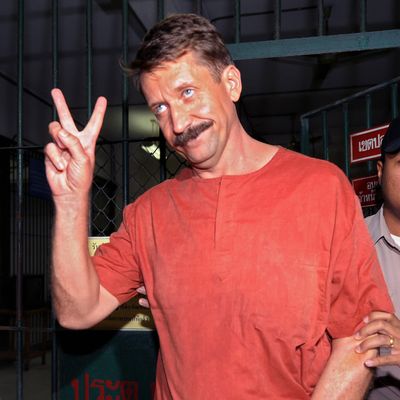
After nearly ten months in detention in Russia, WNBA star Brittney Griner is returning to the United States after the U.S. negotiated a rare prisoner swap in exchange for the Russian arms dealer Viktor Bout.
The entire ordeal has been a strange example of jockeying between two powerful adversaries — Griner’s arrest for bringing less than a gram of hashish oil into the country, her nine-year sentence in a remote penal colony — made stranger by the trade for Bout, a notorious gun trafficker sentenced to 25 years in the U.S. for a litany of charges. As Bout heads home, here are some of the wildest clips from the notorious career of the so-called “merchant of death.”
He got into the business selling arms to the Taliban’s enemies and Liberia’s dictator.
A competitive volleyball player born in what is now Tajikistan in 1967, Bout used his connections from his time in the Soviet military to begin moving weapons from the fallen Soviet Union in the 1990s. In Afghanistan, he sold small arms to the rebels who became the Northern Alliance, the groups united to push back the Taliban. His business thrived in Africa, where he set up some aboveboard companies (a passenger airline in the Central African Republic) and aided humanitarian efforts (he claims the French government contracted him to move troops to the country during its 1994 genocide). He also reportedly worked with some of the biggest human-rights abusers of the decade, selling to Libya’s Muammar Qaddafi, Tutsi militias in the Second Congo War, and the former Liberian president Charles Taylor.
He says he can read 15 languages.
After serving in the Soviet Army in western Ukraine as a teenager, Bout was accepted into the Military Institute of Foreign Languages, where he crafted his talents as a polyglot. In an interview with The New Yorker, Bout said he could “read fifteen or sixteen languages, go to the market with nine or ten, and fluently speak five or six.” That includes Esperanto, a constructed language made in 1887 for international use that has roughly 100,000 fluent speakers.
He was known as the “McDonald’s of arms trafficking.”
After the fall of the Soviet Union, Moldova and Ukraine became the sources of the black-market arms trade, with tens of thousands of small arms, millions of rounds of ammunition, and large numbers of missiles lying dormant. Bout, who had amassed a cargo fleet of around 60 planes, became the man to get them out of there. “Victor Bout had become the McDonald’s of arms trafficking — he was the brand name,” an arms investigator for Human Rights Watch told the New York Times in 2003. In the same profile of Bout, the investigator said, “If I told you everything, I’d get the red hole right here,” and pointed to his forehead.
He evaded capture for years.
Illegal international arms trafficking is a very difficult arena for prosecutors, as Interpol requires the cooperation of local officials. Naturally, Bout operated in nations that were not inclined to pitch in. Although he first appeared on the radar of the CIA and British intelligence in the early 1990s, it took until early 2001 for the U.S. to open a case against him when the National Security Council was given evidence that he might have been servicing planes of the Afghani national airline, which had been co-opted by the Taliban. But after 9/11, the government dropped the case to pursue the war on terror. A 2002 Belgian warrant for money laundering through the diamond trade also failed to get him.
The U.S. finally nabbed him in an elaborate sting.
In 2008, Drug Enforcement Administration agents conducted a sting in which they posed as members of FARC, the Colombian rebel group, and attempted to purchase 100 surface-to-air missiles and rocket launchers. When Bout appeared in Thailand to make the deal, DEA agents and local police arrested him in a Bangkok hotel. In 2011, he was convicted of conspiring to kill U.S. nationals, conspiring to kill U.S. officers and employees, conspiring to acquire and use anti-aircraft missiles, and conspiring to provide material support to a designated foreign terrorist organization. He was sentenced to 25 years and was serving his time at a federal prison in Illinois.
His lawyer, Steve Zissou, once represented Al Qaeda members.
During the Trump years, Bout hired a lawyer in Queens named Steve Zissou who was famous for his name (Wes Anderson gave him a credit to avoid any trouble with the 2004 film that bore it) and his infamous clientele (which included former Al Qaeda member Ahmed Khalfan Ghailani and mob boss Thomas DiFiore). Zissou successfully predicted the timing of Bout’s prisoner swap — it would come after the midterms, he told Intelligencer in September — and made a pretty compelling argument in his client’s name as well:
“No money was ever exchanged,” Zissou says. “No weapons were ever exchanged. He was retired, living in Moscow, and targeted specifically with a made-up crime simply so that he could be charged in the U.S. The U.S. is the only country that prosecutes cases like that. And they asked that Viktor be sentenced to life without parole.” Zissou slams on his desk: “Life without parole! For a talk crime!”
Even the judge who sentenced Bout in 2011, Shira Scheindlin, considered the sentence too harsh for the crime he was convicted of. “It is virtually undisputed that until the DEA went after Bout, he had not committed a crime chargeable in an American court in all his years as an arms dealer,” she said at Bout’s sentencing, where she gave him the minimum number of years for the crimes at hand. “But for the approach made through this determined sting operation, there is no reason to believe that Bout would ever have committed the charged crimes.”
The movie Lord of War was purportedly based on Bout’s life.
Nicolas Cage’s character in the 2005 film Lord of War had an American accent, sure, but the role of Yuri Orlov was clearly crafted from Bout’s work: Cage buys from Ukraine and runs guns throughout Africa in the 1990s. In the movie, finished years before Bout’s actual arrest, the character gets caught by the DEA but is released because he’s also shipping arms to groups the U.S. supports but cannot formally supply.






























